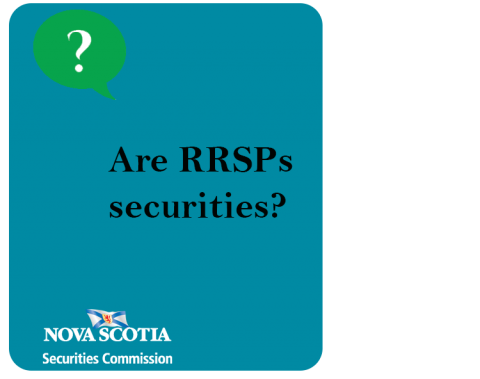Submitted by nsscadmin on

With the calendar turning over to 2018 for many investors it’s Registered Retirement Savings Plan (RRSP) season. Along with it comes a deluge of questions regarding RRSPs and in what ways they fall under the jurisdiction of the Nova Scotia Securities Commission.
Upfront what investors need to know is that an RRSP is not a security. In fact, an RRSP isn’t even an investment itself. At least not in the way a bond or mutual fund is. An RRSP is a trust account that holds other investments to fund your retirement. You don’t purchase RRSPs, but instead you purchase other investments to hold within your account. Your RRSP account has many special features and incentives.
The first of which is the many different types of investments that it can hold. This includes a wide range of investments including:
Cash
GICs
Bonds
Treasury Bills
Mutual Funds
ETFs
Equities
Canadian Mortgages
Income Trusts
Most of these investments are securities, meaning the selling and advising on them is regulated by NSSC. That of course means anyone offering you these investments need to be registered to do so. As with all dealings with financial advisers, the NSSC recommends doing your full diligence and making sure your adviser is registered and checks off all the other boxes to help you reach your financial goals. You can learn more about finding an adviser in our old post on How Do I Find an Adviser That’s Right for Me.
Anyone who files an income tax return can open and contribute to an RRSP. The amount someone can contribute is capped annually based on your earned income, but these amounts can also be carried over to future years if not used.
The main benefits related to RRSPs are tax benefits. These come in two forms – tax deferred growth and tax deductions.
An investment held in an RRSP account grows tax deferred. This means that any profits made on these investments through interest, dividends or capital gains are not immediately taxable as income. Investors with RRSP accounts should also know that these taxes are only deferred and will have to be paid when funds are withdrawn.
The other tax benefit that comes along with an RRSP is a tax deduction. This means that your taxable income is reduced by the amount you contribute up to a certain amount. For example, say you made $20,000 in 2017. You are allowed to contribute up to 18 percent of your earned income into an RRSP account, which equals $3,600. If you were to contribute the maximum amount of $3,600 you would only have to pay tax on $16,400 of your income.
